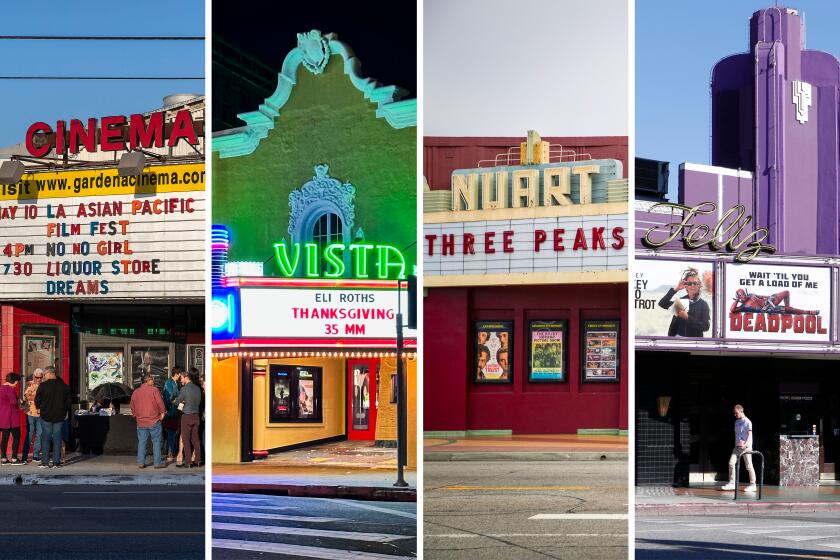Review: A California boy searches for a sense of self over one summer in the exquisite ‘Dìdi’

One of the most plaintive refrains of the Y2K era was sung by Mark Hoppus of Blink-182: “Well, I guess this is growing up.” The band’s hit song “Dammit” was released in 1997 and precedes the setting of Sean Wang’s narrative feature debut, “Dìdi” — unspooling in a Fremont, Calif., of 2008 — by a decade. But the poignant pop-punk sentiment hangs over this coming-of-age period piece nevertheless.
Our protagonist, Chris (Izaac Wang), finds himself in a tricky transitional moment: the summer before freshman year of high school. His identity is in flux, wobbling on the ever-shifting grounds of personal insecurity, fickle friendships and family pressure, and his unsteady sense of self is represented in the film by his various names and nicknames.
There’s the endearment “Dìdi” (Mandarin for “little brother”) used at home by his mother, Chungsing (Joan Chen), and grandmother, Nai Nai (Chang Li Hua). His middle school pals call him “Wang Wang,” one of a few silly monikers among his longtime friend group, who preen and posture beyond their years. But he’s also starting to feel that maybe he just wants to be “Chris,” which is how he introduces himself to a group of slightly older skater boys when he’s searching for connection, adrift in a Northern California summer.
The film staff saw much in Park City, Utah, during the 40th annual Sundance Film Festival. Here were our 10 top picks: stirring dramas and documentaries.
In this loosely autobiographical tale, writer-director Wang zeroes in on this specific, fleeting moment of life, just a couple of months long, and throws it under his cinematic microscope, examining all the awkward agony and brief ecstasies of this age. Wang previously mined his Taiwanese American family background for last year’s Oscar-nominated documentary short “Nai Nai & Wài Pó,” about his grandmothers, one of whom appears in “Dìdi” as Chris’ grandmother.
In addition to the cultural and geographical specifics, Wang also digs into the distinctive visual and sonic environment in which the story takes place. Chris and his friends, who come from a melting pot of East and Southeast Asian American families, have sprouted up in a digital landscape that flowers with MySpace Top 8s, power-pop band merch and AOL Instant Message chimes. The film opens with a shaky, grainy YouTube video of Chris and his friends blowing up a mailbox, his joyful, childlike face captured in freeze frame as he’s running away.
Wang utilizes this mixed-media approach to presenting Chris’ life, lived equally offline and on-, and the juxtapositions in form reflect what’s happening internally for Chris too. Low-res DV camera footage of Chris’ pranks and skate tricks that he posts online contrasts with the warm, intimate closeups of the film’s cinematography elsewhere (by Sam A. Davies). Chris’ real-life social interactions are fumbling and uninformed, unlike his online chatting, which is bolstered by furious Google and Facebook searches, trolling personal pages for clues. So much of his life is mediated though computer screens that, in person, he flails.
We’ve mapped out 27 of the best movie theaters in L.A., from the TCL Chinese and the New Beverly to the Alamo Drafthouse and which AMC reigns in Burbank.
But it’s not just social media that makes up his world. Race and culture also fundamentally shape his reality, and Wang allows that theme to emerge organically and indelibly, allowing the audience to witness how Chris navigates his own Asian American identity. Things are not so hard among his Korean and Pakistani friends, but with the white and Black skater guys and their crew, he chafes at the nickname “Asian Chris,” the only moniker he tries to edit — an attempt that ultimately backfires.
Much of “Dìdi” is about the halting, inadvertent mistakes that Chris makes in his fumbling attempts at connection: blocking the instant messages of his crush Madi (Mahaela Park) instead of telling her how he feels; deleting a bunch of videos he’s taken of his new skater friends simply because one was imperfect; exploding at a classmate during a PSAT tutoring session. But Izaac Wang’s performance of this tortured teenage soul — so young, still in braces — is a sensitive expression of the insecurity Chris feels around others and anxiety about how he will be perceived. Wang’s performance is mirrored by Chen as his mother, a housewife with an artist’s heart. She delicately balances steeliness and vulnerability to deliver a heartrending performance.
Sean Wang’s commitment to realism means that some of the storylines don’t feel entirely finished — just as storylines in life often don’t. Chris messes up, he wallows, he does his best to make things right and they don’t always wrap up neatly. He keeps moving forward, trying to figure out who he is, what he wants and to feel secure enough to savor those short, blissful moments of connection and freedom. Friends come and go, but family remains. We watch his journey to arriving at that simple but profound realization and, well, I guess this is growing up.
Katie Walsh is a Tribune News Service film critic.
'Dìdi'
In English and Mandarin, with subtitles
Rating: R, for language throughout, sexual material and drug and alcohol use — all involving teens
Running time: 1 hour, 34 minutes
Playing: In limited release Friday, July 26
More to Read
Only good movies
Get the Indie Focus newsletter, Mark Olsen's weekly guide to the world of cinema.
You may occasionally receive promotional content from the Los Angeles Times.












